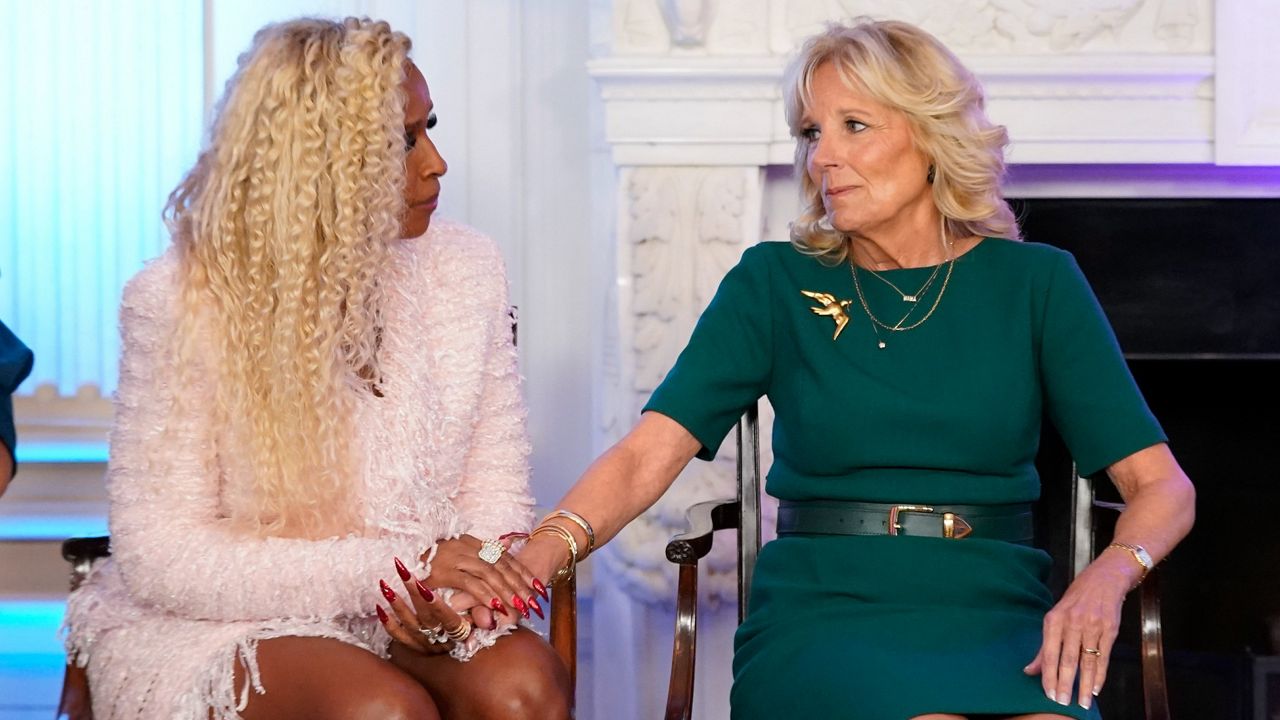The relaunch of the Cancer Moonshot initiative took another step forward Monday as first lady Jill Biden and singer Mary J. Blige were among those who helped kick off a pair of new roundtables that will work to better prevent, detect and treat breast and cervical cancer.
What You Need To Know
- The relaunch of the Cancer Moonshot initiative took another step forward Monday as first lady Jill Biden and singer Mary J. Blige were among those who helped kick off a pair of new roundtables that will work to better prevent, detect and treat breast and cervical cancer
- The Beau Biden Cancer Moonshot initiative, named after Joe Biden’s son, who died of brain cancer in 2015, was created through the 21st Century Cures Act passed by Congress in the final weeks of the Obama administration in 2016
- As president, Joe Biden reignited the program earlier this year and set a goal of cutting the country’s cancer death rate in half over the next 25 years
- The American Cancer Society will lead the new roundtables, which will aim to spur changes and investment in combating cancer by bringing together scientists, the medical community, public health agencies, the private sector and community organizations.
“The word ‘cancer’ still has the power to strike fear into our hearts, but it doesn't have to be that way,” Biden said during an event in the State Dining Room at the White House. “Because we have power, too, more than we ever know. We're going to create a world where we can discover and dream our way past its paralysis, where we come together as a united community and rewrite the story that cancer tells.”
The Beau Biden Cancer Moonshot initiative, named after Joe Biden’s son, who died of brain cancer in 2015, was created through the 21st Century Cures Act passed by Congress in the final weeks of the Obama administration in 2016. The goal of the initiative is to accelerate the rate of progress made against cancer.
As president, Joe Biden reignited the program earlier this year and set a goal of cutting the country’s cancer death rate in half over the next 25 years.
The American Cancer Society will lead the new roundtables. They will aim to spur changes and investment in combating cancer by bringing together scientists, the medical community, public health agencies, the private sector and community organizations.
Karen Knudsen, CEO of the American Cancer Society, said the roundtables are expected to pave the way for commitments from members to increase access to screenings and quality care for breast and cervical cancer as well as new health policies and recommendations on strategies for reducing cancer disparities among racial and ethnic groups.
“Through these powerful roundtables — these ground shots — together we can and will make a difference because we must, because we have the collective expertise and because, frankly, the world is counting on us to improve the lives of individuals from cancer and to create a better future,” Knudsen said.
Motivated by the cancer deaths of several family members, Blige is an advocate for preventive cancer screening. She said by the time her loved ones knew they were sick, it was too late “because the practice of not wanting other people in our business and keeping these topics to ourselves is so deeply rooted into our culture.”
“I'm convinced that if all my aunts, my godmother, my grandparents would have the opportunity to see a campaign like the ones on which I partner with the Black Women's Health Imperative that directed them to go for information, they would have a different outcome today,” Blige said.
The ACS National Breast Cancer Roundtable will be chaired by Dr. Arif Kamal, chief patient officer at the American Cancer Society; Dr. Olufunmilayo Olopade, director of the Center for Clinical Cancer Genetics and Global Health at the University of Chicago; and Virginia breast cancer surgeon Dr. John Williams.
The ACS National Roundtable on Cervical Cancer will be led by Deborah Arrindell, vice president of health policy at the American Sexual Health Association; Dr. Akiva Novetsky, gynecologic oncologist at Westchester Medical Center/New York Medical College; and Dr. Debbie Saslow, a managing director at the American Cancer Society.
“None of us can beat cancer alone, and it will take all of us putting patients and their loved ones at the center of their own cancer journey, from screenings to survivorship,” Jill Biden said.



